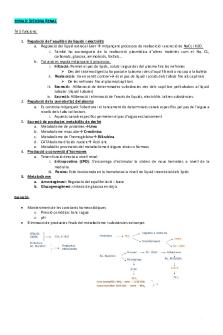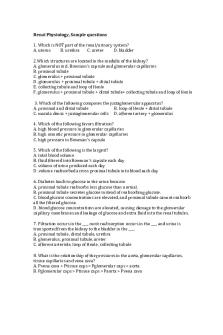PEX 9 ACT 5 Renal System Physiology PDF

| Title | PEX 9 ACT 5 Renal System Physiology |
|---|---|
| Author | E Castaneda |
| Course | General Biology I |
| Institution | University of Missouri-Kansas City |
| Pages | 4 |
| File Size | 99.4 KB |
| File Type | |
| Total Downloads | 99 |
| Total Views | 140 |
Summary
PEX activity...
Description
4/30/2020
PhysioEx Exercise 9 Activity 5
PhysioEx Lab Report Exercise 9: Renal System Physiology Activity 5: Reabsorption of Glucose via Carrier Proteins Name: Erika Castaneda 004-225 Date: 30 April 2020 Session ID: session-f7a5db1d-b529-8a2a-0185-4cd5c7b40f24
Pre-lab Quiz Results You scored 100% by answering 4 out of 4 questions correctly. 1 Renal processing of plasma glucose does not normally include You correctly answered: secretion. 2 How does antidiuretic hormone (ADH) affect the renal processing of plasma glucose? You correctly answered: ADH has no direct effects on renal processing of plasma glucose. 3 Glucose reabsorption in the nephron includes You correctly answered: secondary active transport along the apical membrane of proximal tubule cells. 4 Because carrier proteins are required to move glucose from the lumen of the nephron into the interstitial spaces, which of the following statements is false? You correctly answered: The number of glucose carriers in a nephron can be altered as needed by the body.
Experiment Results Predict Question 1 Predict Question: What will happen to the glucose concentration in the urinary bladder as glucose carriers are added to the proximal tubule? https://media.pearsoncmg.com/bc/bc_0media_ap/physioex/10/ex9/act5/
1/4
4/30/2020
PhysioEx Exercise 9 Activity 5
Your answer: The glucose concentration will remain the same. Stop & Think Questions 1 Why is the glucose concentration the same in both Bowman's capsule and the urinary bladder? You correctly answered: Glucose cannot be reabsorbed in the absence of carriers. 2 Is a transport maximum reached in these experiments? You correctly answered: yes. Experiment Data Glucose Conc. Capsule
Glucose Conc. Distal
Glucose Conc. Bladder
Total Glucose Carriers
Conc. Grad.
6.00
6.00
6.00
0
1200
6.00
4.29
4.29
100
1200
6.00
2.57
2.57
200
1200
6.00
0.86
0.86
300
1200
6.00
0.00
0.00
400
1200
Post-lab Quiz Results You scored 100% by answering 3 out of 3 questions correctly. 1 Glucose carrier proteins are located in which region of the nephron? You correctly answered: the proximal convoluted tubule. 2 If the concentration of glucose in the filtrate exceeds the transport capacity of the carrier proteins, then You correctly answered: a transport maximum has been reached. 3 Why does glucose appear in the urine of untreated diabetic patients? https://media.pearsoncmg.com/bc/bc_0media_ap/physioex/10/ex9/act5/
2/4
4/30/2020
PhysioEx Exercise 9 Activity 5
You correctly answered: An excessive amount of glucose is present in their filtrate.
Review Sheet Results 1 What happens to the concentration of glucose in the urinary bladder as the number of glucose carriers increases? Your answer: As the glucose carriers increases the concentration of glucose in the urinary bladder decreases. I was incorrect in my prediction. Since sodium is the primary driving force for renal re-absorption I mistakenly assumed glucose would not affect the concentration of glucose. 2 What types of transport are utilized during glucose reabsorption and where do they occur? Your answer: The types of transport utilized during glucose re-absorption is the secondary (indirect) active transport which occurs along the basolateral membrane. 3 Why does the glucose concentration in the urinary bladder become zero in these experiments? Your answer: Glucose concentration in the urinary bladder becomes zero in the experiment since the glucose levels in the filtration system does not reach the threshold resulting in more available transport protein than there are glucose. 4 A person with type I diabetes cannot make insulin in the pancreas, and a person with untreated type II diabetes does not respond to the insulin that is made in the pancreas. In either case, why would you expect to find glucose in the person's urine? Your answer: Since a person with type I diabetes cannot make insulin in the pancreas resulting in an elevated level of glucose in the blood. More glucose in the blood results in increase levels of glucose in the filtration system resulting in glucose being discharged during urination. https://media.pearsoncmg.com/bc/bc_0media_ap/physioex/10/ex9/act5/
3/4
4/30/2020
PhysioEx Exercise 9 Activity 5
In turn, a person with diabetes type 2 does not respond to the insulin being made in the pancreas resulting in increased levels of glucose in the system which is filtered and discharged in the urine.
https://media.pearsoncmg.com/bc/bc_0media_ap/physioex/10/ex9/act5/
4/4...
Similar Free PDFs

Physiology MCQ - Renal
- 15 Pages

Renal Physiology Practice MCQ\'s
- 6 Pages

Physiology 2 Exam 3 Renal
- 22 Pages

Renal System - Study guide
- 2 Pages

Renal system exp report
- 3 Pages

Tema 9: Sistema renal
- 6 Pages

System of physiology guide
- 10 Pages

Act 5
- 2 Pages

Act 5
- 4 Pages
Popular Institutions
- Tinajero National High School - Annex
- Politeknik Caltex Riau
- Yokohama City University
- SGT University
- University of Al-Qadisiyah
- Divine Word College of Vigan
- Techniek College Rotterdam
- Universidade de Santiago
- Universiti Teknologi MARA Cawangan Johor Kampus Pasir Gudang
- Poltekkes Kemenkes Yogyakarta
- Baguio City National High School
- Colegio san marcos
- preparatoria uno
- Centro de Bachillerato Tecnológico Industrial y de Servicios No. 107
- Dalian Maritime University
- Quang Trung Secondary School
- Colegio Tecnológico en Informática
- Corporación Regional de Educación Superior
- Grupo CEDVA
- Dar Al Uloom University
- Centro de Estudios Preuniversitarios de la Universidad Nacional de Ingeniería
- 上智大学
- Aakash International School, Nuna Majara
- San Felipe Neri Catholic School
- Kang Chiao International School - New Taipei City
- Misamis Occidental National High School
- Institución Educativa Escuela Normal Juan Ladrilleros
- Kolehiyo ng Pantukan
- Batanes State College
- Instituto Continental
- Sekolah Menengah Kejuruan Kesehatan Kaltara (Tarakan)
- Colegio de La Inmaculada Concepcion - Cebu






